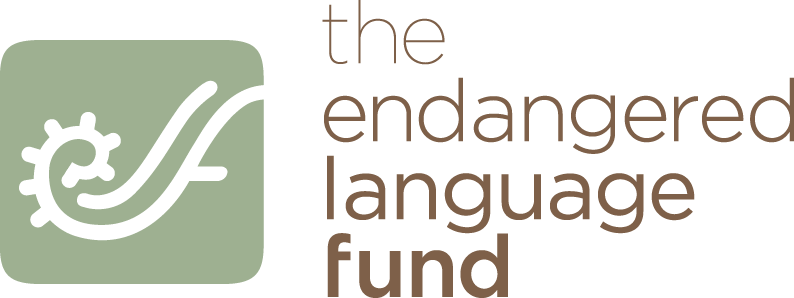Language Legacies Grant Recipients - 1997
Alice Anderton - Intertribal Wordpath Society
Production of original television dramas in Choctaw and Creek
Production of original television dramas in Choctaw and Creek.
Awarded to Alice Anderton of the Intertribal Wordpath Society. This project will produce two dramas starring native speakers of these two Native American languages, which are currently spoken in Oklahoma. Captioned versions will be shown on cable access channels, and videotapes will be made available to the native speakers throughout the state.
Mark Donohue - University of Manchester
Work on the Wasur languages of Indonesia
Language data collection will be conducted for several languages in a region that has only recently been officially recognized as a distinct ethnic region.
Gary Holton - University of California, Santa Barbara
Tanacross language documentation project
Tanacross, an Alaskan Athabaskan language, has only a handful of native speakers, most over sixty years of age. The goals of this work are to achieve a systematic documentation of the Tanacross grammar and lexicon, to provide literacy materials for speakers (including a conversational dictionary and collections of stories with English translations), and to contribute to our linguistic understanding of this little-studied language.
Andrej Kibrik - University of Alaska
Recording the last fluent speakers of Kuskokwim in Alaska
This little-studied Athabaskan language is down to three households which use it regularly. The linguistic work will aid in the teaching of the younger generation, especially through the audio recordings that will give a much better sense of the feel of the language than written sources can.
Mary Linn - University of Kansas
Preserving Yuchi, a Native American isolate
Only nineteen fluent speakers remain of the Yuchi language. Once they are gone, the Yuchi tribe will be unable to learn more of their heritage, and linguists will be unable to solve the mystery of the last remaining language isolate of the Eastern US. Linn's dissertation work will help on both fronts.
Rob Pensalfini - MIT
Preparing language materials for Jingulu of Australia
Only about ten fluent speakers remain of this language, which is situated in the region between two major language families. Influences of both those families appear in the language, giving it many unique characteristics. Texts and a dictionary are being prepared, and the schools there are ready to make use of them.
Ronald Red Elk - Comanche Language and Cultural Preservation Committee
Making a rediscovered manuscript useful to the Comanche community
In 1996, a manuscript dictionary of Comanche, containing over 4,000 entries, was discovered in the Smithsonian. With the help of the Endangered Language Fund grant, this work will be combined with other sources and corroborated with the remaining speakers of Comanche, so that future generations will have as complete a record of the language as possible.
Karen Somerville - Gakeemaneh/Gignamoane, New Brunswick
Immersion programs in Micmac, Maliseet and Passamaquoddy
The speakers of these Eastern Algonquian languages have joined forces to try to further the use of the languages by the young. The ELF grant will help purchase equipment for several language immersion programs that are being developed.
Janne Underriner - University of Oregon
Recording the last two speakers of Klamath
As with many Native American languages, only the oldest members of the Klamath tribe can still speak the language. Younger members of the tribe have come to realize that this is truly their last chance to know this important part of their heritage. With the aid of this work by a professional linguist, the Klamath hope to preserve what they can.
Ofelia Zepeda - University of Arizona and the Tohono O'odham Nation
Further work on the Tohono O'odham (Papago) Dictionary Project
Further work on the Tohono O'odham (Papago) Dictionary Project. Awarded to Ofelia Zepeda, University of Arizona and member of the Tohono O'odham Nation. This language is still the first language of most tribal members over the age of 25, but children are less likely to learn it. When completed, the extensive dictionary will help reinforce the language skills of young parents and be a permanent resource to native speakers and others interested in the language.
Production of original television dramas in Choctaw and Creek
Production of original television dramas in Choctaw and Creek.
Awarded to Alice Anderton of the Intertribal Wordpath Society. This project will produce two dramas starring native speakers of these two Native American languages, which are currently spoken in Oklahoma. Captioned versions will be shown on cable access channels, and videotapes will be made available to the native speakers throughout the state.
Mark Donohue - University of Manchester
Work on the Wasur languages of Indonesia
Language data collection will be conducted for several languages in a region that has only recently been officially recognized as a distinct ethnic region.
Gary Holton - University of California, Santa Barbara
Tanacross language documentation project
Tanacross, an Alaskan Athabaskan language, has only a handful of native speakers, most over sixty years of age. The goals of this work are to achieve a systematic documentation of the Tanacross grammar and lexicon, to provide literacy materials for speakers (including a conversational dictionary and collections of stories with English translations), and to contribute to our linguistic understanding of this little-studied language.
Andrej Kibrik - University of Alaska
Recording the last fluent speakers of Kuskokwim in Alaska
This little-studied Athabaskan language is down to three households which use it regularly. The linguistic work will aid in the teaching of the younger generation, especially through the audio recordings that will give a much better sense of the feel of the language than written sources can.
Mary Linn - University of Kansas
Preserving Yuchi, a Native American isolate
Only nineteen fluent speakers remain of the Yuchi language. Once they are gone, the Yuchi tribe will be unable to learn more of their heritage, and linguists will be unable to solve the mystery of the last remaining language isolate of the Eastern US. Linn's dissertation work will help on both fronts.
Rob Pensalfini - MIT
Preparing language materials for Jingulu of Australia
Only about ten fluent speakers remain of this language, which is situated in the region between two major language families. Influences of both those families appear in the language, giving it many unique characteristics. Texts and a dictionary are being prepared, and the schools there are ready to make use of them.
Ronald Red Elk - Comanche Language and Cultural Preservation Committee
Making a rediscovered manuscript useful to the Comanche community
In 1996, a manuscript dictionary of Comanche, containing over 4,000 entries, was discovered in the Smithsonian. With the help of the Endangered Language Fund grant, this work will be combined with other sources and corroborated with the remaining speakers of Comanche, so that future generations will have as complete a record of the language as possible.
Karen Somerville - Gakeemaneh/Gignamoane, New Brunswick
Immersion programs in Micmac, Maliseet and Passamaquoddy
The speakers of these Eastern Algonquian languages have joined forces to try to further the use of the languages by the young. The ELF grant will help purchase equipment for several language immersion programs that are being developed.
Janne Underriner - University of Oregon
Recording the last two speakers of Klamath
As with many Native American languages, only the oldest members of the Klamath tribe can still speak the language. Younger members of the tribe have come to realize that this is truly their last chance to know this important part of their heritage. With the aid of this work by a professional linguist, the Klamath hope to preserve what they can.
Ofelia Zepeda - University of Arizona and the Tohono O'odham Nation
Further work on the Tohono O'odham (Papago) Dictionary Project
Further work on the Tohono O'odham (Papago) Dictionary Project. Awarded to Ofelia Zepeda, University of Arizona and member of the Tohono O'odham Nation. This language is still the first language of most tribal members over the age of 25, but children are less likely to learn it. When completed, the extensive dictionary will help reinforce the language skills of young parents and be a permanent resource to native speakers and others interested in the language.

